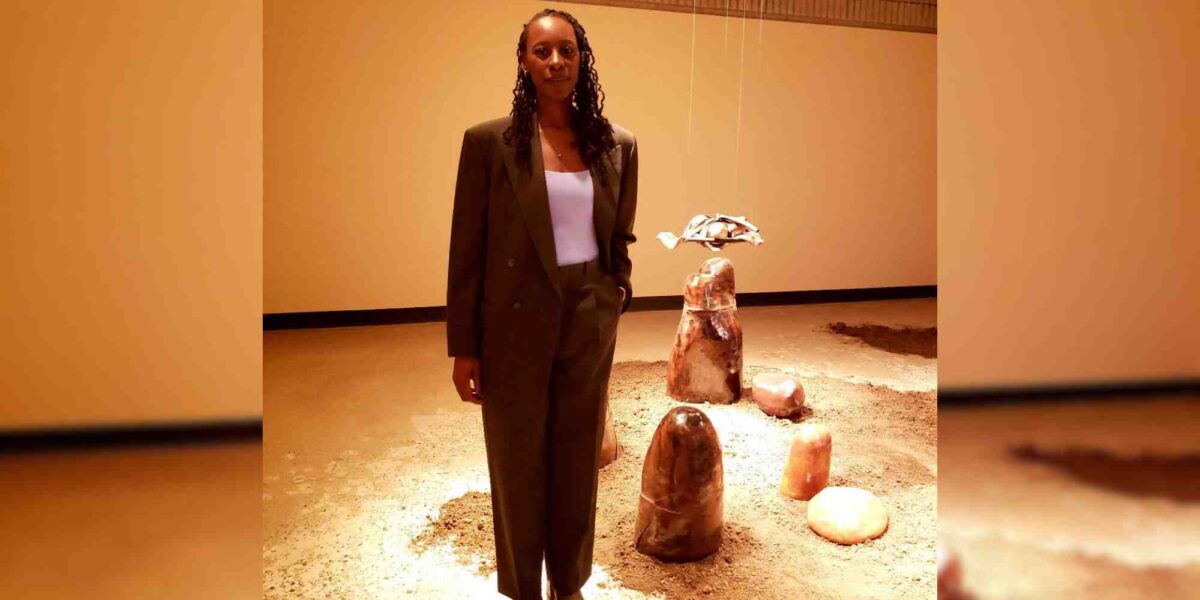Ndafunga Dande (Thoughts of Home) is currently on display at the Art Gallery of Burlington.
Thoughts of Home invites viewers to enter an intimate space where hand-built ceramic boulders and mauuyu fruit co-exist with Zimbabwean war songs that have morphed into songs of ceremony, gathering and sustenance.
The exhibition is part of Chiedza Pasipanodya’s continuing journey and exploration of what gets remembered – smells, tastes, histories – and transmitted through the repetition of ceremony, song or even clay.
I sat down with Pasipanodya, the Canadian-Zimbabwe artist who explained the significance of the materials used in the piece, as well as what they hope viewers will take away from the installation.
Bringing the outside, in
“With my work, I’m wanting to offer the possibility of a shift in atmosphere – entering into a different environment,” Pasipanodya said. “I really wanted it to be a portal when you’re entering from one space into another – outdoor space indoors.”
The installation brings together soil from Burlington, ON and North American clay fashioned into boulders as well as suspended mauuyu, or baobab, fruits native to Zimbabwe.
The surface of the fruit blackened with Zimbabwean herbs, flower petals, lemon rinds and wood chips from the oldest violin maker in Toronto using raku and saggar-firing are suspended mid-air.
The real challenge for Pasipanodya was recreating the natural, slightly orange-tinged light of Zimbabwe in a windowless room. But from all accounts her perseverance was successful.
Pasipanodya played with the idea of what it means to elevate a narrative alongside ideas of sustenance.
“Because the soil is on the ground and the boulders are on the ground, I wanted to look at variation that could meet you at different levels of your body,” Pasipanodya said.
The barrenness of the landscape juxtaposed against the abundant mauuyu bathed in that Zimbabwean light teleports viewers to a world that really cries out, sit and rest a while – be nourished and renewed.
Kubivsa Nyadzi
Kubivsa Nyadzi (Shamelessness, 2023), the hour-long video mounted just outside the installation was a curatorial decision to include some of the photos from Pasipanodya’s residency and time in Zimbabwe. They recognized that folks may not be aware of the landscape, colours or spaces being referenced so decided to create a visual video catalogue.
The accompanying audio is equally intentional enhancing the overall theatrical aspects of the installation.
“I’m thinking about the senses. There was smell with the soil. In terms of vision, it was really about the lighting in the space. And, so sound was also another element I thought I could engage with the audience. The inclusion of sound is important because I find sound to be a lot more intimate than a video,” Pasipanodya shared.
They recorded the audio without filming it because they wanted to ensure folks involved retained their privacy, autonomy and agency. The most important aspect was the music, the voices and the singing.
Art and environment are political
Pasipanodya acknowledges that colonialism, independence, race, class and gender figure prominently in her work. In fact, some of the songs were sung during Zimbabwe’s liberation struggles. Today, those folk songs are an integral part of gatherings and celebrations.
Shamelessness is an invitation to release some of the shame around the histories of war in Zimbabwe. It is an invitation to sing and name some of those experiences. It is also an opportunity to acknowledge that these war stories, these horrors, exist alongside people laughing and being in ceremony and that’s all part of living.
“I wanted to include [war songs] in this exhibition because I feel independence in Zimbabwe was talked about a lot. But the genocide that existed in Zimbabwe was not,” Pasipanodya observed.
“There was a lot of silencing around coloniality and war histories. So, I wanted to slowly introduce this subject matter into my work through this oral practice,” they added.
Pasipanodya acknowledges that someone who fought in Zimbabwe would have a very different experience hearing the audio than someone who was introduced to these songs through ceremony.
Pasipanodya’s work is political simply by virtue of who they are and how they filter information. It comes from a place of landscape being anything but neutral.
They consider landscape painting and installations to be quite political. That’s why Pasipanodya created an intimate space that invites viewers to go inward through the lighting, to focus on the entire space of the environment and take time to reflect.
They also introduce concepts of race and gender through landscape arguing that Canadians think landscape is neutral when in fact land is one of the most contested things. Ndafunga Dande (Thoughts of Home) is on display at the Art Gallery of Burlington from now until January 7, 2023.



